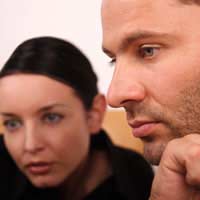Psychotherapeutic Interventions

Along with counselling psychotherapy is a method used by specially trained people whose aim is to help individuals address and overcome problems in their life; this can be any problem including addiction.
It is achieved by the addict attending a pre-booked session in a place that is neutral, safe and has a calming influence. The therapist will provide a place for exploration, support and expression.
The therapy used often encourages the inclusion of loved ones and relationships are focussed on and re-established where possible.
A range of techniques can be used in psychotherapy; these include cognitive therapies, behavioural therapies, motivational sessions and psychodynamic therapies. All techniques use methods of communication, whether this be listening or verbally.Psychotherapy can be differentiated from counselling as a more specific therapy and practitioners are often mental health professionals who have undertaken a course that provides certification and often requires the person to be licensed.
Cognitive Therapy
This is used to treat depressive illness and anxiety, both of which can be the cause of or the consequence of addiction. Cognitive therapy uses the reorganisation of thoughts as a method of gaining a new perspective and understanding of issues. Thoughts and concepts are rephrased and readdressed in a manner than is more realistic and has more logic than the individual had previously.This therapy aims to provide users with a way of identifying situations when relapse or drug use would normally be initiated, and teaches ways of dealing with these feelings.
Behavioural Therapy
Using this therapy, the individual learns ways of reducing fears and anxieties by spending more time directly addressing and challenging the problem, instead of not thinking about it or delaying dealing with issues. From this the person develops new ways in which to manage the situation, changes their behaviour accordingly and puts in to place new coping strategies.Psychodynamic Therapy
This involves the discussion of relationships and feelings towards others. It can bring in past experiences and expectations allowing the individual to think about decisions they have made and how the knowledge gained from this can be applied to the way in which decisions will be made in the future.Motivational Sessions
This technique is used to try and change the outlook and attitudes of the addict. It does this by allowing the individual to identify and recognise the negative attributes of their habit and adopt a more positive attitude that aims to live without the addiction. This type of therapy is focussed on the individual leading the train of thought, coming up with suggestion by themselves without being lectured by the therapist.Psychotherapists may use a combination of these techniques and tailor the treatment plan to the needs of the individual. The therapist will also try to encourage the individual to express their feelings using expressive techniques; these techniques vary between therapists.
Sessions should be regular, conducted at the same place by the same person and a typical session will last up to one hour. The length of treatment needed is dependent on the person and this should be discussed early on in the treatment so a plan can be devised.
- Memory Training to Treat Addiction
- Uncommon Drug Addictions and How to Stop
- Addiction Treatment Centers: What to Expect
- New Programmes for Addictions
- Vaccine for Nicotine Addiction
- Using Self-Help Techniques to Addiction Free
- Effects of Withdrawal from an Addiction
- Substitute Medication to Overcome Addiction
- Abstinence And Helping To Overcome Addictions
- Counselling for an Addiction
- Treating Addictions With Acupuncture
- Choosing The Right Treatment for an Addiction
- Hypnosis for an Addiction


Re: Addiction to Shopping
Hi, I came to realize that I have shopping addiction and it’s getting out of control. I need help but I don’t know where to start. I would…
Re: Beating an Addiction to Pornography
I am in a long term relationship and have a fulfilling sexlife, but i struggle with porn, i feel the need and temptation…
Re: Offering Support to an Addiction Sufferer
My big sister died of a brain tumor then 6 week later my mum went too . I have multiple myeloma and am terminal.…
Re: Addiction to Shopping
I am now at my whits end, my husband is spending money like it has gone out of fashion, and now i am homeworking, I take in the deliveries…
Re: How to Assess The Level of an Addiction
Over a series of many years I have discovered that I have an addicted personality, it has never worried me too much…
Re: How to Assess The Level of an Addiction
Over a series of many years I have discovered that I have an addicted personality, it has never worried me too much…
Re: Offering Support to an Addiction Sufferer
I am an addict and I have just separated from my husband of 16 years as we together developed a cocaine problem.…
Re: Recognising Alcohol Addiciton
Ever since I can remember, I've always overindulged before/during social events. It's got to the point where I've been hateful to…
Re: Beating an Addiction to Chocolate
I suffer from anxiety and mild depression. As a stay at home mum I find myself bored sometimes and truthfully stressed. My…
Re: Offering Support to an Addiction Sufferer
Hi im dpeaking on behalf of my partner , who has a bad alcohol addiction..And this has been going on for neaely…